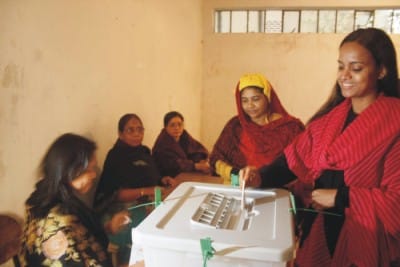Testing the limits of tolerance

Where's the change? Photo: Amdadul Huq/ DrikNews
THE current electricity, water and gas crises, coupled with high prices of daily consumption goods for the middle and the poor classes, and compounded with low prices received by agricultural product growers, have put the present government on the defensive.
The ever-critical opposition is on the warpath, reminding people of their "mistake" in endorsing the Mahajot combine in the last election. Though we are used to blame game politics, it is doubtful how seriously people take the hatao sarkar movement threatened by the emasculated BNP-Jamaat combine.
The government's problem is that the electricity-water-gas assault on people is due to these issues' interconnectivity and hence cannot be resolved without jointly considering all components.
The people are wary of the opposition's hidden agenda, the most immediate being to disrupt the war crimes trials, a subject on which almost complete unanimity exists throughout Bangladesh and abroad.
Allied with the trial is the possibility of banning religion-based politics, though the government refuses to combine the two issues.
The trial is needed to blot out from the national conscience a long-festering cancer and to reconfirm the position of Bangladesh as a member of the civilised comity of nations.
Barring a few rogue and failing states, the duty to protect and the duty to prevent endorsed by the UN summit is the transcendental sacred duty of humanity. Fortunately for Bangladesh, with the demise of communism, the struggle for power is less ideological and more about sharing the pie.
Bangladesh rejoices at the revival of democracy that Prof Larry Diamond characterised as "the fallacy of electoralism." Diamond contends: "Many in these countries, especially the poor, are citizens only in name and have few meaningful channels of political participation. There are elections, but they are contests between corrupt, clientistic parties. There are parliaments and local governments, but they do not represent the broad constituencies. There are constitutions but not constitutionalism."
Diamond's indictment, however harsh, does not prescribe solutions for averting the fallacy of electoralism. In reviewing John Kampfner's Freedom for Sale, John Dunn mentions Kampfner's principal thesis as most people in most places, when offered the choice, will sacrifice much of their liberty and of others, with little hesitation, in return for gratifying levels of personal consumption.
The vector, Kampfner adds, of any durable dominion is a balance between threat and reward. A gun barrel, he says, is clearly a more comprehensible and compelling signal than ideology.
Through the passage of civilisation, mankind has discovered democracy to be superior to monarchy, technocracy, theocracy, or any other form of government, but this passage has been long and perilous.
Besides, elections, in themselves, do not necessarily guarantee equality or good governance. Authorities of countries like Bangladesh, having experienced interruptions in democracy, face an eternal question: whether delivery of consumable goods should take priority over political goods, though the delivery of one without the other is difficult if not impossible.
John Dunn cites Singapore as an example as a small and rich country which, thus far, has been able to "stage a carefully constrained charade of elections." One may also cite China as an example where authoritarian rulers have supplied goods and services to people, at modest prices, even accepting the premise that the price of goods is relative to the buyer's real income.
Given the income disparity between the rich and the poor, and urban and rural populations, it is uncertain if Francis Fukuyama's proclamation of the end of history will become prophetic, in the sense that one cannot preserve all the achievements of capitalism while categorically rejecting the forms of ownership of the means of production.
Future events in China will determine democracy's sustainability and its monopolistic claim to rule the world. Whether US hegemony, advocated by historian Niall Ferguson, who believes that the alternative to a single super-power is not a multi-lateral utopia but an anarchic nightmare, is necessary to attain this objective is debatable -- and such hegemony is unlikely to be accepted by the international community.
In our case, while the war crimes trials are absolutely necessary to bring back law and order, the government would be well advised to rein in students who claim they belong to the ruling party and are involved in illegal acts, to bring down prices of essentials so they are affordable, and to resolve the sufferings of the common people from the trio mentioned earlier.
Ultimately, the people's happiness is the only thing that will determine whether the incumbent will return to power in the next election.

 For all latest news, follow The Daily Star's Google News channel.
For all latest news, follow The Daily Star's Google News channel. 



Comments